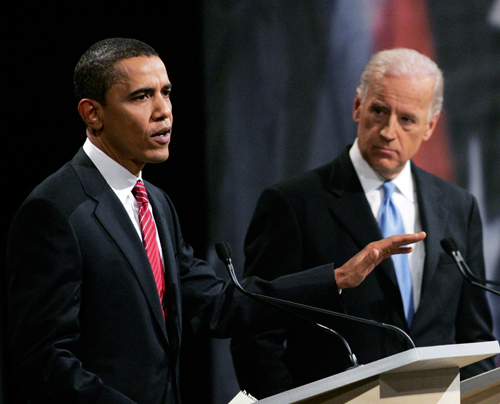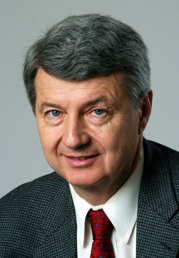Berkeleyan
 |
Senators Barack Obama and Joe Biden at a presidential debate earlier this year. (Chris Gannon photo) |
What Biden brings to the party
As the Democrats convene in Denver, Berkeley’s top pundits and political handicappers assess Barack Obama’s choice for veep
![]()
| 27 August 2008
Maria Echaveste, a lecturer-in-residence at the School of Law and a vocal supporter of Hillary Clinton during the Democratic primaries, “wasn’t overwhelmed” by Barack Obama’s selection for running mate when the news broke late last Friday. But while longtime Delaware Senator Joe Biden is hardly a new face, she says, she soon came around to the view that his extensive foreign-relations experience, combined with his leadership on such issues as choice and civil rights, make him “an excellent choice.”
To Echaveste, a Democratic National Committee member who is at the party’s convention in Denver this week with the California delegation, Biden is “a fighter,” likely to be an effective counter-puncher in what promises to be a tough campaign against Republican nominee John McCain and his as-yet-unnamed running mate. And she considers him “good on immigration and a thoughtful supporter of Israel” — positions, she says, that “can be helpful in Florida and with Hispanic voters.”
 Bruce Cain |
Bruce Cain isn’t so sure. Cain, a veteran Berkeley political scientist who currently heads the UC Washington Center, expects Biden to have “little or no effect on the polls in the short run, or on the final outcome of the election in the long run.” A strong performance at the convention or in a vice-presidential debate, he says, will boost confidence in the Democratic ticket on the margin — just as a weak showing “will reflect badly on Obama’s judgment,” he adds, raising the specters of Thomas Eagleton and Dan Quayle, whose selections prompted questions about Democrat George McGovern in 1972 and Republican George H.W. Bush in 1988. In the end, though, “presidential elections are about the top guy on the ticket.”
 Robert Reich |
Not surprisingly, perhaps, Robert Reich — who served as labor secretary under Bill Clinton and is now a professor of public policy at the Goldman School — views the choice through a policy lens. He praises Biden as “an excellent pick,” citing his vocal criticism of President Bush’s handling of the Iraq war, his role in bringing “stability and peace to the Balkans,” and his leadership on “stemming the proliferation of weapons of mass destruction from the former USSR.”
Reich also points to the respect that world leaders have for Biden, who has served on the Senate Foreign Relations Committee for three decades and is currently its chairman. Biden, he observes, was the first member of Congress to visit the republic of Georgia — at the invitation of its president, Mikheil Saakashvili — after the Russian invasion earlier this month. During a recent moment of crisis in Pakistan, he adds, Biden fielded phone calls from both then-President Pervez Musharraf and the late opposition leader Benazir Bhutto “before either talked to President Bush.”
Biden’s foreign-policy experience,” says Reich, will not only “help restore America’s leadership in the world” but will “burnish Obama’s foreign-policy credentials.”
From the perspective of Republican Dan Schnur — John McCain’s communications director during his 2000 run for the White House, and currently a Berkeley lecturer in political science — that was precisely the thinking of the Obama campaign itself. “There are two things Joe Biden brings to the ticket,” he says. His foreign-policy résumé, Schnur explains, allows him to stand toe-to-toe with the McCain ticket and say, “I’ve been doing this just as long as you have, and here’s where you’re wrong.” Secondly, Biden adds “the ability to speak to the working-class voters with whom Obama has really struggled,” says Schnur.
(As to whether a weekend McCain campaign ad trumpeting Biden’s criticism of Obama during the Democratic debates might signal bad news for former Massachusetts Gov. Mitt Romney — a failed White House contender who, though currently viewed as a likely McCain choice for vice president, frequently had harsh words for McCain, and vice versa — Schnur doubts it. He calls the TV spot “the obligatory shot to take right after the candidate is announced” and predicts that “going forward, the focus will be on Obama.”)
Social psychologist Jack Glaser, an associate professor of public policy, agrees that Biden’s national-security credentials beef up the ticket, and could help neutralize McCain’s advantage on that front — an advantage he terms “symbolic,” based, he explains, on the Arizona senator’s military experience and his “age and tenure in the Senate,” rather than on an actual command role.
But Glaser, whose research focuses on stereotyping, prejudice, and discrimination, believes Biden balances the ticket in another, possibly critical respect.
“America has made tremendous progress in racial and gender attitudes and rights,” he observes. “But racial and gender bias are still very real and prevalent, with nontrivial proportions of Americans indicating explicitly in surveys that they are not prepared to vote for a black or woman candidate. Having a doubly unconventional ticket may be too much to ask of the current American electorate.”
Going with “a senior, white male,” concludes Glaser, was a “wise strategic choice.”
Echaveste, who served in Bill Clinton’s Department of Labor before becoming a senior White House aide, discounts reports — said to have angered some of Hillary Clinton’s most ardent supporters — that the senator was never vetted for the vice-presidential slot, despite Obama’s insistence that she “would be on anybody’s short list.”
“I don’t believe that Hillary was never considered,” she says. Nonetheless, she notes, “there were hurdles” in the way of her selection — notably, Atlantic Monthly’s recent publication of internal Clinton campaign memos laying out lines of attack on Obama, and “the question of how you could manage a spouse who was also an ex-president.”
Echaveste notwithstanding, Cain declares himself “skeptical” about the new No. 2, expressing doubts not only that Biden can help win the blue-collar vote but also that the selection will mollify Clinton diehards.
“Biden does nothing to bring the Clinton holdouts back into the fold,” he says. “This could prove to be a fatal mistake in the end.”
Obama’s decision to pass on a “game changer” like Clinton or Republican Sen. Chuck Hagel “tells me that he thinks he can win pursuing the present course.” Adds Cain, ominously: “He may not be right.”

